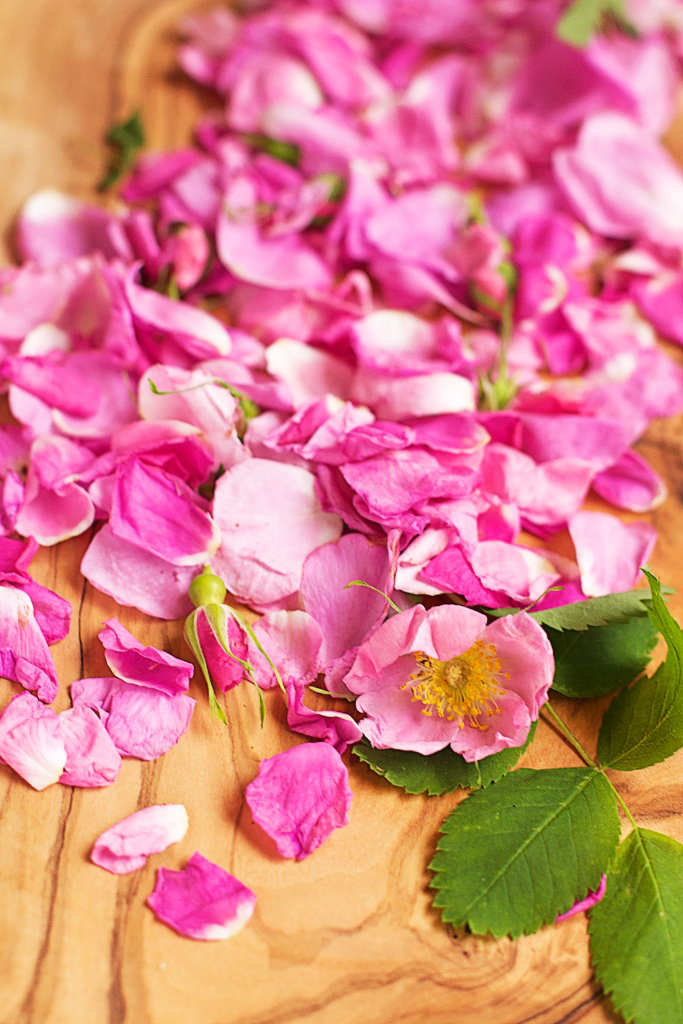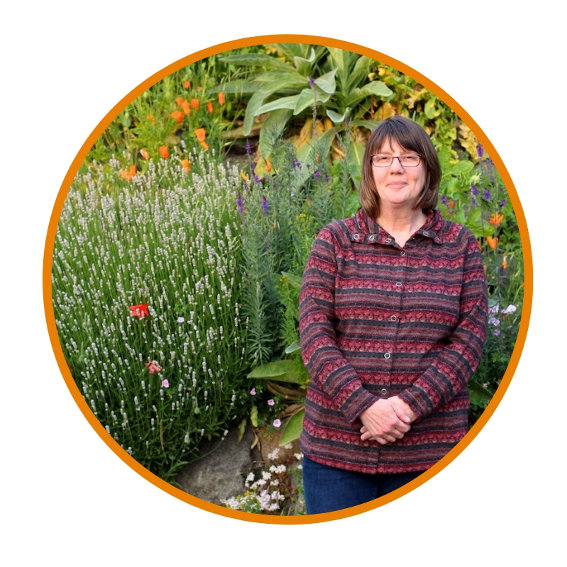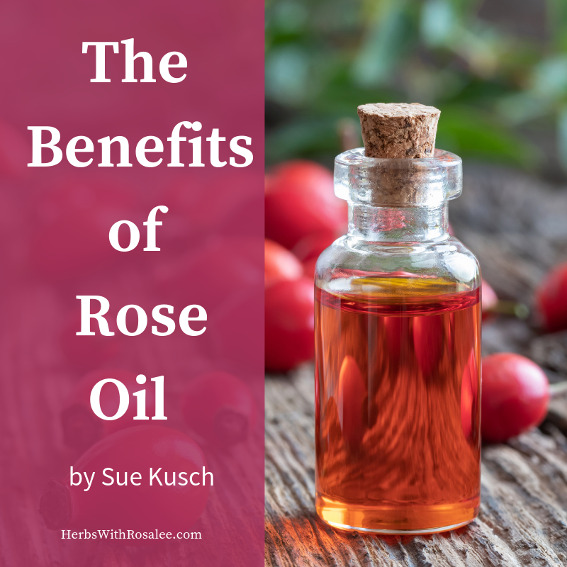Get weekly tips, recipes, and my Herbal Jumpstart e-course! Sign up for free today.

Benefits of Rosehip Oil
Share this! |
|
Roses are a global business these days. Large, corporate-owned greenhouses in South America are dedicated to growing and shipping cultivated roses throughout the world for Valentine’s bouquets and weddings, and the Rose Valley in Bulgaria grows enough rose petals on centuries-old rose plantations to produce half of the world’s rose essential oil. In Chile and South Africa, wild rose bushes are maintained in the mountainous regions by small villages whose residents wildcraft rose hips each fall to sell to processors to make rosehip oil - an expensive base oil used in skincare products worldwide.
What is Rose Essential Oil?
Rose essential oil and rose hip oil are sometimes confused by consumers. Rose essential oil is extracted from the petals of two cultivated roses: the Damask rose (Rosa damascena) and the Cabbage rose (Rosa centifolia). The petals are hand-picked by women and then extracted using one of two processes: steam distillation, which produces the ottos or attars of rose; and solvent extraction, which uses a chemical for extraction and produces the rose absolute. The labor-intensive process and the need for many petals to make a potent essential oil is why it is one of the most expensive essential oils on the market.
In ancient history, roses were associated with the gods and goddesses. Cleopatra apparently understood this: she layered her palace’s floors with fresh rose petals when hosting public events and used copious amounts of rosewater and fresh rose petals to seduce Mark Antony. The scent of rose essential oil is exquisite and it only takes a drop or two in your cosmetic recipe to enjoy it.

What is Rosehip Oil?
Rose hip oil is made with the orange-red fruits of the Rosa rubiginosa and Rosa canina. Both species originated in Europe and Asia, and were brought to different parts of the world through European colonization. In Chile and Argentina, the rose shrubs entered the wild mountainous regions and, eventually, became an opportunity for rural villagers to earn income through the wildcrafting of the rosehips each fall. As the demand for the benefits of rosehip oil increased, cultivation of the two species spread to parts of Africa and Europe.
Benefits of Rosehip Oil
Rose hip oil does not have the exquisite scent of the essential oil but the benefits of rosehip oil to our skin are certain. Rich in essential fatty acids, it is an ideal emollient for mature, environmentally damaged, and prematurely aged skin. It’s considered a dry oil because it quickly penetrates the skin and does not leave a greasy residue. It can be applied directly or used in skincare recipes (serums, lotions, creams) and is typically used on facial and neck skin.
Do the Benefits of Rosehip Oil Include Eliminating Wrinkles?
Let’s be real: our culture is obsessed with youth and anti-aging. Many of the products in the $500 billion a year cosmetic industry target older women who are beginning to see the fine lines and wrinkles on their faces. How your face ages includes a complex mix of factors: genetics, environmental exposure, UV radiation, diet, smoking and daily care practices. Even behaviors like frequent squinting and rubbing the delicate skin around your eyes can contribute to lines and sagging. Wearing a hat that shades your face, applying an oil or cream daily, and eating healthy are three actions that can make a big difference. Personally, I proudly wear my aging face with its fine lines and wrinkles: I earned every one of them!
The benefits of rosehip oil are often cited as being due to containing retinol, which is not technically true. Retinol is a synthetic form of Vitamin A that is produced by animals and heavily marketed as an anti-aging product in the cosmetic industry. While it is effective at smoothing out fine lines and facial wrinkles, the Environmental Working Group has scored it as a high-hazard product that should not be used by pregnant or breastfeeding women.
The benefits of rosehip oil come from the trans-retinoic acids that are a natural form of vitamin A found in plants. It’s believed it promotes healthy skin cell rejuvenation and, with regular application, will smooth out but not eliminate facial lines and wrinkles. Rose hip's high levels of fatty acids, specifically omega-6 and omega-3, support skin health by hydrating and nourishing the skin’s cells. The anti-inflammatory properties of omega-3 can help to calm inflamed and sensitive skin reactions like rosacea, sunburn and acne.
Antioxidants present in rose hip oil improve the appearance of pigmentation and revitalize the skin’s tone. For years, rose hip oil was recommended for healing surgical scars despite little scientific evidence to support the practice, but recent research supports this topical treatment.1
How Rosehip Oil Is Made
Like any plant material, the quality of rose hip oil is directly related to how it is processed. In the case of rose hips, the extraction process determines the quality. Once the rose hips are harvested, the tiny seeds within the hip contain the oil and are removed by hand. (If you have yet to open a rose hip to see its insides, I encourage you to do so. It will give you a true appreciation of the work involved.) Only 3% of the seed contains oil so you can imagine the high number of seeds needed to sustain the demand for this popular oil.
The most efficient extraction method is to chemically extract the oil using hexane - a toxic chemical that is used on edible seed and nuts for cooking oils. To remove the chemical residue, the oils are often heated to high degrees, which alters the color, taste and quality of the oils. This is seldom used with rose hips because the market demands a higher quality oil.
A second method is the traditional mechanical extraction done with a screw press. This is called expeller-pressed and you may be familiar with it as the primary process used to make olive oil. One of the challenges with this method is that heat builds up during the extraction process and this can affect the quality, flavor and color of the oils.
Cold expeller-pressed is the ideal and preferred method for the full benefits of rosehip oil. It is still a mechanical process, but the temperature is controlled so that the newly extracted oil is kept at 90°F. Unfortunately, this practice is not regulated in the US as it is in Europe so you have to rely on a processor’s commitment to quality (Mountain Rose Herbs offers such exceptional oil here). In addition, rose hip oil oxidizes quickly, reducing the quality of the oil when exposed to air. Commercial processors often have a containment system in place that allows the rose hip oil to move directly from the extraction press to a container without being exposed to air.
When purchasing rose hip oil, look for the term ‘cold expeller-pressed’ to ensure that you are getting the highest quality. Once purchased, rose hip oil is best stored in the refrigerator and used sooner rather than later. It’s smarter to buy small quantities that get used over a short period of time instead of buying a large quantity that may sit for a months or years.
While researching this process, I came across several claims that some suppliers are adulterating both the rose essential oil and rose hip oils. I am reminded of the importance of purchasing from ethical suppliers for my herbs and oils. Suppliers who develop relationships with their growers, harvesters and processors as well as their customer, work hard to build a level of support and product quality based on mutual trust. Again, Mountain Rose Herbs can be trusted with the quality of their products.
Citations
1. Valerón-Almazán, Pedro, Anselmo J. Gómez-Duaso, Néstor Santana-Molina, Miguel A. García-Bello, and Gregorio Carretero. "Evolution of Post-Surgical Scars Treated with Pure Rosehip Seed Oil." Journal of Cosmetics, Dermatological Sciences and Applications 05, no. 02 (2015): 161-67. doi:10.4236/jcdsa.2015.52019.

Sue Kusch, a former community college instructor and academic advisor, incorporates her experiential wisdom, expertise and science-based research garnered from her three decades of growing vegetables, fruit and herbs into her educational writing about plants and how people use them. In addition to her BA in Social Sciences and Masters in Education, she completed the Master Gardener training in 2011 and two permaculture courses in 2001 and 2014. She has studied medicinal and nutritional uses of herbs, including studies at Herbmentor and East West School of Planetary Herbology, since 1997. An avid reader, lover of historical and folkloric information, and a promising storyteller, Sue writes about the intersection of plants and people.
